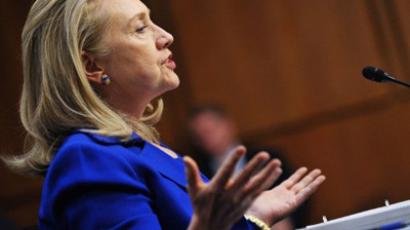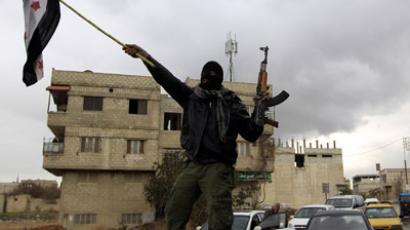'Rebels could use UN chief's words as excuse for free-for-all'
Syria's Ambassador to the UN Bashar Jaafari condemned comments made by UN Secretary General Ban Ki-moon, warning that they could be “interpreted by the armed groups as a legal cover to be able to act in a criminal fashion.”
Jaafari, addressing the UN General Assembly after Ban, said the Secretary General's speech was “aggressive, virulent and slanderous.” “He said during his statement, that the Syrian government had failed in its responsibilities with regards to defending its people. I feel that this is a double injustice,” Jaafari asserted. He insisted that the UN resolution on Syria passed two weeks ago was unfair, unilateral, subjective and “completely unrelated to what is going on the ground in Syria.”In his speech, Ban called on the Syrian government to immediately give humanitarian workers access to the country, noting that the Assad government should let UN humanitarian chief Valerie Amosinto into Syria to assess the situation. Earlier she was denied permission from the government to enter the country. Jaafari answered the demand, saying that his country had accepted a visit by Amos “in principle” and had not refused her access. According to Jaafari, the country was waiting to set a date for the visit. He also insisted that most of Syria is “living normally,” and that the government was sparing no effort to secure a normal life for its people, and to keep all the necessary services working. While admitting that the humanitarian situation has worsened in many areas of the country, Jaafari said the main reasons were the armed assaults, vandalism and unilateral sanctions imposed by some countries. The resulting combination, he maintianed, is a disastrous effect on everyday life in Syria.
‘Sea of lies’ about Syria
Ban said that the civilian losses have been heavy, referring to the unrest in Homs this week.“We continue to receive grisly reports of summary executions, arbitrary detentions and torture,” he noted. “This atrocious assault is all the more appalling for having been waged by the government itself, systematically attacking its own people.”In response to Ban's accusations, the Syrian representative said there has been “a sea of lies” circulating about his country. In his view, the UN chief’s report is more likely to strengthen tensions than to help solve the situation. He also blamed the UN for using reports from “countries which are open enemies of Syria,” thus showing a certain “duplicity” in their calls for dialogue between the government and opposition.Jaafari also pointed out that weapons manufactured in Israel were found in Homs following the rebels' retreat, noting that a number of states are openly admitting to supplying arms to insurgent groups in Syria.He slammed Libya for offering $100 million to help the Syrian opposition. He also harshly criticized the Saudi Arabian UN envoy, who in his speech said that what was happening in Homs resembles the Srebrenica massacre in Bosnia of the 1990s, calling the comparison “shameful.”
‘Things have got very hard on both sides’
Middle East expert Tariq Ali said both sides of the conflict were to blame.“It seems to me that things have got very hard on both sides,” he noted to RT. “The Assad regime carries on as if it doesn’t realize how hated it is by some sections of the population, and the opposition, which is armed now increasingly by the West via its conduits in Qatar, Saudi Arabia and Turkey, are turning nasty.”He said it would not be of help to anyone for Syria to go on like this, with minorities, Christians and other groups being targeted by the so-called liberation forces. “What it suggests is a negotiated settlement and for people to push for both sides to sit around the table.”Ali pointed to the fact that Saudi Arabia and Qatar, both staunch supporters of the Syrian opposition, were themselves hardly shining examples of democracy. “And if what they want to do to Syria is what they’ve just done to Libya, then one has to say that the replacement for Assad will not be any different, except it will be a different group of people carrying out repressive activities,” he added. But Ali didn’t spare criticism of the Assad regime either. “In my opinion, of course, the Assad family, father and son, are responsible for a great deal of bloodshed in Syria.”He supported the idea of Assad leaving power to be replaced by an interim leader that could negotiate with the opposition.














